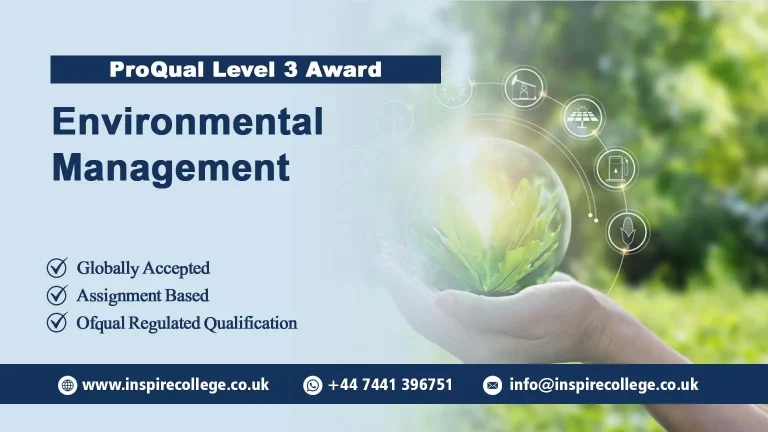
OTHM Level 7 Diploma in Environmental and Sustainability Management
In today’s rapidly evolving world, environmental and sustainability management has become a critical field of study. The OTHM Level 7 Diploma in Environmental and Sustainability Management stands out as a premier qualification for professionals seeking to enhance their expertise and drive meaningful change within organizations. This advanced diploma equips individuals with the necessary skills and knowledge to address complex environmental challenges, implement effective sustainability strategies, and lead initiatives that align with global environmental standards.
The OTHM Level 7 Diploma offers a comprehensive curriculum that delves into key areas of environmental and sustainability management. Participants will gain a deep understanding of environmental policies, sustainable development principles, and the regulatory frameworks that shape the industry. The course emphasizes practical applications, enabling students to develop strategies that not only comply with environmental regulations but also promote long-term sustainability and corporate responsibility.
One of the standout features of this diploma is its focus on strategic management. The program prepares professionals to design and implement sustainability strategies that drive organizational performance and resilience. This includes understanding the impact of environmental issues on business operations, managing environmental risks, and integrating sustainability into corporate governance. With an emphasis on leadership and strategic thinking, the OTHM Level 7 Diploma prepares graduates to assume pivotal roles in driving environmental initiatives and leading sustainability efforts within their organizations.
The diploma is designed for individuals who already have a background in environmental management or a related field and wish to further their expertise. It is ideal for professionals aiming to advance their careers in environmental consultancy, sustainability management, or corporate responsibility roles. The course is also beneficial for those seeking to transition into the field from other areas of business or management.
Enrolling in the OTHM Level 7 Diploma in Environmental and Sustainability Management provides numerous advantages. Graduates will be well-prepared to address pressing environmental issues, contribute to the development of sustainable practices, and support their organizations in achieving environmental goals. Additionally, the diploma is recognized for its rigorous academic standards and practical relevance, ensuring that graduates possess both theoretical knowledge and hands-on experience.
The OTHM Level 7 Diploma in Environmental and Sustainability Management is an excellent choice for professionals seeking to enhance their capabilities in environmental stewardship and sustainability leadership. By offering a robust curriculum that combines theoretical knowledge with practical applications, this diploma equips individuals to make significant contributions to their organizations and the wider community. As businesses and organizations increasingly prioritize environmental sustainability, the demand for skilled professionals in this field continues to grow, making this diploma a valuable investment in your future career.
Delivery Method is Blended (Online and Distance Learning)
These qualifications are designed for learners who are typically aged 21 and above.
The entry profile for learners is likely to include at least one of the following:
- Relevant Level 6 qualification. Normally an Honours degree (or equivalent) from a recognised institution.
- Demonstration of relevant professional experience. Applicants should have at least 3 years professional experience in the field (learners must check with the delivery centre regarding this experience prior to registering for the programme)
- English requirements: If a learner is not from a majority English-speaking country must provide evidence of English language competency.
Mandatory Units
The OTHM Level 7 Diploma in Environmental and Sustainability Management qualification consists of 4 mandatory units and 5 optional units (with candidates taking 6 units in total), 120 credits, 1200 hours Total Qualification Time (TQT) and the recommended Guided Learning Hours (GLH) for this qualification is a minimum of 600 hours.
Mandatory units
Learning Outcomes of OTHM Level 7 Diploma in Environmental and Sustainability Management
Fundamentals of Sustainability
- Understand the key concepts of sustainability and their relation to economic growth and development.
- Understand the context of sustainability and the reasons for urgent action, with a special focus on climate change and biodiversity.
- Understand the role of private enterprises and innovation in the transition to sustainability
- Understand the need for global initiatives and treaties on sustainability and climate change.
- Understand the principles and perspectives of business ethics and its use in discussions regarding climate change and sustainability.
Environmental Science and Energy Transition
- Understand the physics of the energyrelated carbon cycle and its impact on temperature
- Understand the physical principles of harvesting renewable alternatives to fossil fuels and the technological and market developments within this area.
- Understand the physical principles of non-renewable alternatives to fossil fuels, the political sensitivities of nonrenewables and the technological, and market developments related to these sources of energy.
- Understand the dependence of alternative energy sources on storage and grid management
- Understand the trilemma of energy transformation and the need for national policies and international cooperation.
Environmental Management in Organisations
- Understand topics relevant for environmental management and the reasons why organisations should choose to manage them.
- Understand environmental assessment and management tools and their advantages and disadvantages.
- Understand how to develop and deliver environmental performance improvement.
- Understand approaches collection, analysis, reporting and communication of environmental data.
Research Methods
- Be able to develop research approaches in a suitable context.
- Be able to critically review literature on a business research topic.
- Be able to design business research methodologies.
- Be able to develop a research proposal.
Delivering Transformational Change
- Understand how to conduct a materiality assessment to understand priorities for change and change readiness.
- Understand key techniques, practices, behaviours, and knowledge of change management.
- Understand the behaviour of complex systems and how to change them.
- Understand how a leader’s style and approach has a major impact on both team and individual performance, values, and motivations.
- Understand the meaning and purpose of ESG Governance Structure and how to develop it.
Advanced Principles of Net Zero
- Understand the meaning and importance of “net zero” at a conceptual level.
- Understand the application of the fundamentals of Greenhouse Gas (GHG) Accounting.
- Understand science-based targets and their facilitating role to deliver net zero.
- Understand how to communicate an organisation’s response to climate change, net zero pledges and green claims.
- Understand how and to which extent organisations and society can adapt to climate change
Environmental Politics and Policies
- Understand principles and examples of environmental policy and legislation.
- Understand the role of ethics in international climate agreements and governance.
- Understand economic instruments available to effect change related to environmental and social issues
- Understand suasive instruments available to effect change related to environmental and social issues.
- Understand key international agreements related to environmental governance and climate change politics
- Understand the UN Sustainable Development Goals (SDG) and the importance of the sustainability agenda.
Sustainable Finance
- Understand the relevance of the Financial Industry to sustainability across different financial instruments and asset classes.
- Understand how physical and transition risks, particularly those related to climate change, translate to financial risks and how this is managed by financial organisations and central banks.
- Understand sustainable / ESG financing strategies and products that facilitate sustainable transition and development.
- Understand the value and use of ESG ratings and labels.
Sustainability as a Business Strategy
- Understand the relationship between Economics and Sustainability and the four rationales of why sustainability is in businesses’ interest.
- Understand how sustainability impacts businesses’ value chain and how companies can capitalise on being sustainable.
- Understand the limitations of “traditional” accounting and the need to approach the concept of value holistically.
- Understand the concept of the circular economy, circular business models and the challenges related to operating and financing circular businesses
- Understand the role of marketing and stakeholder engagement in the transition to sustainability and the risks of poor marketing practices.
The OTHM Level 7 Diploma in Environmental and Sustainability Management is tailored for individuals from diverse backgrounds who share a common passion for environmental conservation and sustainability. Specifically, this course is ideal for:
- Environmental Professionals: Experienced individuals working in environmental management, conservation, or related fields who seek to enhance their knowledge and skills to address complex environmental challenges and lead impactful initiatives.
- Sustainability Advocates: Individuals passionate about promoting sustainability practices within organizations, communities, and society at large. This course provides them with the tools and strategies needed to drive positive change and advocate for environmental stewardship.
- Corporate Leaders and Managers: Executives, managers, and professionals working in corporate settings who recognize the importance of integrating sustainable practices into business operations. This diploma equips them with the expertise to develop and implement environmentally friendly strategies and policies.
- Policy Makers and Government Officials: Policy makers, government officials, and policymakers involved in shaping environmental policies and regulations. This course offers insights into emerging environmental issues and equips them with the knowledge to develop effective policies that promote sustainability and protect natural resources.
- Career Changers: Individuals seeking to transition into a rewarding career in environmental management and sustainability from diverse professional backgrounds. This diploma provides them with a comprehensive understanding of environmental principles and practices, preparing them for new opportunities in the field.
Future Progression
Achieving the OTHM Level 7 Diploma in Environmental and Sustainability Management qualification enables learners to progress into or within employment and/or continue their further study. As this qualification is approved and regulated by Ofqual (Office of the Qualifications and Examinations Regulation), learners are eligible to progress to Master’s top-up programmes with advanced standing at many universities in the UK and overseas.
Register Now
FAQs for OTHM Level 7 Diploma in Environmental and Sustainability Management






